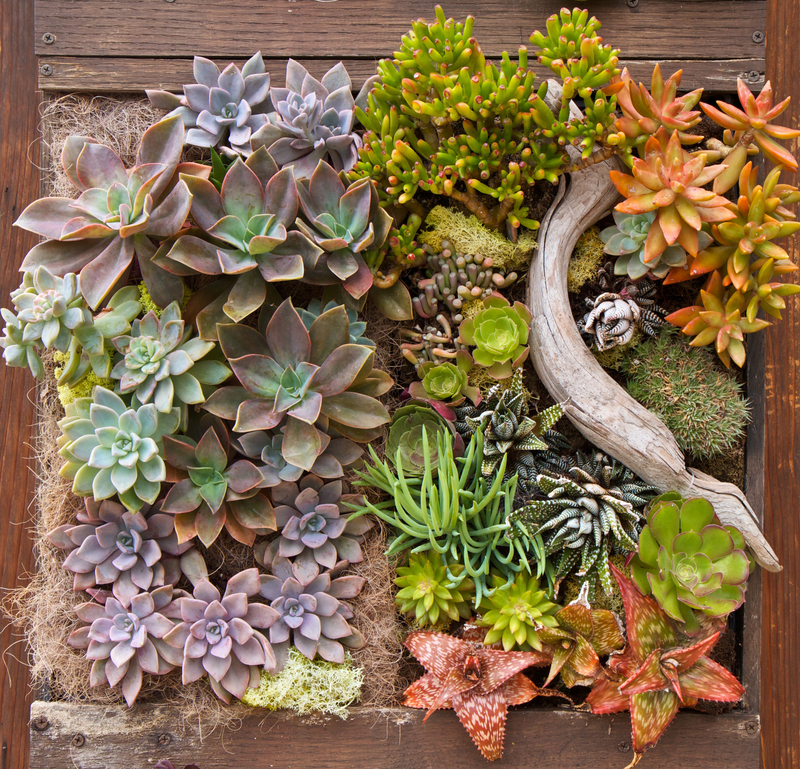Gain Confidence with These 9 Foundations of Gardening
Posted on 13/09/2025
Gain Confidence with These 9 Foundations of Gardening
Are you eager to cultivate a green thumb but not sure where to begin? Gardening can be a rewarding, therapeutic, and sustainable hobby for people of all ages. However, starting your gardening journey can feel overwhelming without the right information. Whether you have a sprawling backyard or a modest balcony, understanding the basics of gardening will boost your confidence and set you up for success.
In this comprehensive guide, you'll discover the 9 essential foundations of gardening that every beginner should know to thrive. These pillar concepts will help you build gardening confidence, avoid common mistakes, and create a flourishing outdoor (or indoor) space year-round.

1. Understanding Your Garden's Microclimate
The first step toward gardening success is to understand your microclimate. Each garden area has its unique weather patterns, sun exposure, and wind conditions. Knowing these factors is fundamental to ensuring your plants thrive.
Key Microclimate Considerations
- Sun Exposure: Observe which parts of your garden receive full sun, partial shade, or are always shaded.
- Wind Patterns: Notice areas where wind tends to blow strongest, which can dry out plants faster.
- Frost Pockets: Cold air may settle in dips or valleys, affecting sensitive plants.
- Soil Drainage: After a rain, look for spots where water pools--these are important for choosing the right plants.
By spending time in your garden, journaling observations, and using apps or online tools, you can identify your garden's specific conditions.
2. Choosing the Right Plants for Your Zone
Plant selection is the cornerstone of gardening confidence. Research your USDA Hardiness Zone or local climate zone to choose plants that will survive and thrive in your environment. Each plant is adapted to a particular range of temperatures, rainfall, and daylight hours.
How to Choose Suitable Plants
- Research: Use garden center labels, plant databases, and extension office resources.
- Match Microclimates: Ensure light, water, and temperature needs are compatible.
- Start Simple: Begin with hardy, low-maintenance varieties to build your gardening skills.
- Native Choices: Native plants are adapted to your region and support local pollinators.
By making informed plant choices, you'll avoid unnecessary disappointment and set your garden up for success.
3. Soil Preparation and Fertility
Soil is the foundation--quite literally--of gardening! The right soil preparation is crucial for strong, healthy plant growth. Confident gardeners know how to assess, amend, and maintain their garden soil.
Building Rich, Productive Soil
- Test Your Soil: Use an at-home kit or send a sample to a local lab to check pH, structure, and nutrient levels.
- Add Organic Matter: Compost, manure, and mulch boost fertility, improve texture, and enhance moisture retention.
- Mulching: A 2-3 inch layer of organic mulch suppresses weeds and keeps soil moist.
- Avoid Over-Tilling: Excessive tilling breaks down soil structure and reduces beneficial organisms.
Healthy soil = healthy plants! Investing time in your soil now means less effort and more satisfaction in the future.
4. Efficient Watering Practices
Watering is one of the most common gardening challenges. Overwatering and underwatering both stress plants, so understanding your garden's water needs will make you a confident and successful gardener.
Smart Watering Tips
- Water Deeply, Not Frequently: Deep watering encourages stronger root growth than light, daily watering.
- Early Morning Watering: Watering early prevents evaporation and fungal diseases.
- Observe Soil Moisture: Use your finger or a moisture meter to check that the root zone is damp, not soggy.
- Try Drip Systems or Soaker Hoses: These irrigation options improve efficiency while conserving water.
Mastering efficient watering will help you avoid common plant problems and foster vibrant growth whether you're growing vegetables, flowers, or shrubs.
5. Planting Techniques for Success
An essential gardening foundation is learning how to plant correctly. From seeds to transplants, proper technique ensures plants establish quickly and thrive in their new environment.
Best Practices for Planting
- Space Properly: Follow recommended spacing for each variety for airflow and nutrient access.
- Planting Depth: Place seeds and plants at the proper depth to avoid stunted growth or rot.
- Handling Seedlings: Support the root ball and handle stems gently to prevent transplant shock.
- Water After Planting: Water thoroughly after planting to settle the soil around roots.
Confident gardeners don't rush; they take the time to give each plant the right start!
6. Regular Maintenance and Observation
The secret to gardening confidence is consistency. Regular, attentive care helps you catch problems before they escalate and reinforces your success with visible progress. Gardening is not a set-and-forget activity--it's a relationship with your plants!
Maintenance Tasks to Prioritize
- Weeding: Remove weeds regularly to prevent competition for nutrients and water.
- Deadheading: Snip spent flowers to encourage more blooms and tidy plants.
- Inspect for Pests: Check leaves for insect eggs, chewing damage, or signs of disease.
- Staking and Pruning: Support top-heavy plants and prune as needed for shape and health.
Consistency in small tasks leads to major improvements in garden health and appearance.
7. Integrated Pest Management
Pests are a natural part of gardening, but confident gardeners use integrated pest management (IPM) to address issues while protecting the environment. IPM combines cultural, biological, and mechanical strategies to avoid relying solely on chemicals.
Principles of Integrated Pest Management
- Encourage Beneficial Insects: Ladybugs, lacewings, and bees help keep harmful pests in check.
- Crop Rotation: Rotating crops each season reduces the buildup of soil-borne pests and diseases.
- Manual Removal: Hand-picking pests or using barriers can be very effective.
- Spot Treatment: If you must use pesticides, apply them precisely and selectively.
Successful pest management keeps your garden healthy, bountiful, and balanced.
8. Continuous Learning and Experimentation
The most confident gardeners never stop learning. Gardening is both an art and a science--it's a journey of ongoing discovery. Don't be afraid to try new plants, tools, or methods.
Ways to Grow Your Gardening Knowledge
- Read Books, Blogs, and Articles: Stay up-to-date on best practices for the plants you love.
- Take Classes: Local nurseries often offer in-person or virtual gardening workshops.
- Talk to Fellow Gardeners: Join local garden clubs or online groups for tips and camaraderie.
- Track Your Progress: Keep a garden journal with photos and notes on successes and challenges.
Every garden is unique; learning from both triumphs and setbacks grows your confidence over time.
9. Cultivating Patience and Enjoyment
Patience is perhaps the ultimate gardening foundation. Plants don't follow our schedules! Weather, pests, and mistakes happen. Cultivating patience--while celebrating each small victory--allows you to truly enjoy your garden and all it offers.
Tips for a Rewarding, Patient Gardening Journey
- Set Realistic Goals: Start small and expand as your confidence grows.
- Celebrate Small Wins: Marvel at each sprout, bloom, or harvest.
- Practice Mindfulness: Use gardening as an opportunity to connect with nature and unwind.
- Find Joy in the Process: Remember, every gardener faces challenges--mistakes are just steps toward mastery.
Confidence in gardening comes not just from knowledge, but from delighting in each moment spent outdoors and appreciating the natural world's pace.

Final Thoughts: Build Your Gardening Confidence Today
Developing confidence in gardening is a journey of exploration, observation, and growth. By focusing on these nine foundational principles, you'll feel empowered to nurture healthy plants and create a vibrant garden space. From understanding your unique microclimate to embracing lifelong learning and patience, these invaluable tips will help you grow--inside and out.
- Start simple and expand your skills as you gain experience.
- Observe your garden daily to build intuition and confidence.
- Ask questions, seek support, and celebrate every step in your gardening adventure.
Ready to get growing? Apply these nine foundations of gardening and watch your confidence bloom just as beautifully as your plants. Whether you're cultivating a kitchen garden, a flower paradise, or a lush balcony retreat, the secrets to a thriving green space are now in your hands. Happy gardening!
Frequently Asked Questions about Gardening Foundations
What's the best way for beginners to start gardening?
Start small with a few easy-to-grow plants, focus on soil health, and experiment with containers or raised beds. Remember, building confidence in gardening comes from consistent, hands-on learning.
How do I know which plants will grow well in my area?
Check your USDA zone and talk to local nurseries for advice on naturally adapted plants. Native species are a safe bet for both beginners and advanced gardeners.
What should I do if my plants aren't growing well?
Review the nine foundations above, starting with soil health, sun, and water. Make small adjustments and observe improvement over time. Don't be afraid to ask local experts for tips!
Gardening is a lifelong journey--every season brings new lessons and opportunities to grow. With these nine foundations, you'll soon be tending your plants with confidence and joy.
Latest Posts
The Art of Transforming Waste into Healthy Soil
Get started with your own container garden today
Gain Confidence with These 9 Foundations of Gardening
How to Turn Your Outdoor Space into a Child-Friendly Oasis
Transform Your Garden with Hedge Trimming Shapes and Techniques



